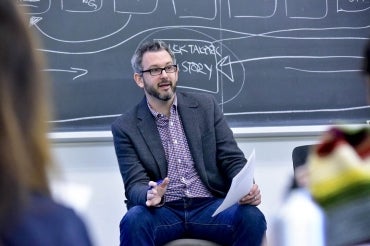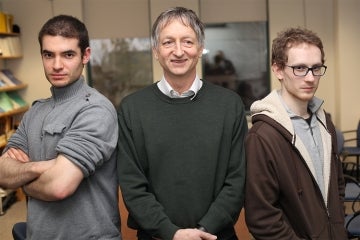From primatologist to novelist: Andrew Westoll’s creative writing journey

Published: August 24, 2016
Andrew Westoll has always been fascinated by stories about the natural world. As a child he would escape to the far reaches of the globe through the articles about Jane Goodall in the pages of National Geographic.
Westoll, who teaches creative writing at University of Toronto Scarborough, started out as a primatologist. He spent a year in Suriname studying capuchin monkeys and it was there that he realized his true calling to become a writer. The experience inspired his first book The Riverbones: Stumbling After Eden in the Jungles of Suriname. He followed that up with The Chimps of Fauna Sanctuary, a biography of a family of chimps who were rescued from a research laboratory to live in an animal sanctuary near Montreal that earned him the 2012 Charles Taylor Prize for Literary non-fiction.
His new book The Jungle South of the Mountain (HarperCollins) marks his first foray into fiction. Writer Don Campbell spoke to Westoll about the novel and the inspiration for the protagonist Stanley, a researcher who has clearly been living alone in the bush for far too long.
What inspired you to try fiction?
It goes back to when I first started writing seriously because I started out wanting to write fiction. I was an aspiring fiction writer before I really knew about non-fiction. When I took a non-fiction course as an undergrad my mind was blown open by the possibilities, so I forgot about fiction for a while. Two years after The Chimps of Fauna Sanctuary came out I was looking around for my next project and I had a couple of non-fiction ideas, but then this character Stanley, a monkey researcher, occurred to me. Once Stanley appeared in my mind and I understood what his predicament was, it was too compelling not to follow through with it.
What’s the most satisfying part of writing a novel compared to non-fiction?
I think the world-building that comes along with a novel. Not only the world you get to create but the character development as well. Those things are just as hard as they are satisfying. It also becomes a marathon of work, but when you get through it and discover the world you’ve created for these characters, it’s tremendously satisfying. There’s also satisfaction in developing a respectable plot. You need to have a plot where you can imagine it happening even if your story has elements of fantasy in it.
An interest in the natural world, and of primates in particular, is a familiar thread in your work. Where did that interest originate?
It’s hard to discount the influence Jane Goodall and National Geographic had on me. I grew up in Oakville and had a fairly suburban childhood. I wasn’t that adventurous. I certainly wasn’t going out hiking and camping every weekend, but I had a lot of adventures in my mind. When I could read National Geographic’s coverage of Jane Goodall I became engrossed by those stories. It’s that arm-chair travelling to the far-reaches of the globe where these extraordinary animals are living in full societies that just astounded me.
I also can’t discount my family’s history because my grandfather was a fairly well known paleontologist who taught at Harvard. My dad is also a geologist. Science has always been in my family and early on I had an aptitude for science.
 Tell us about Stanley. Did you draw on any of your experience working as a primatologist in developing him?
Tell us about Stanley. Did you draw on any of your experience working as a primatologist in developing him?
Stanley’s a primatologist who has been living alone in the bush for far too long. The only thing he’s been doing for the past seven years has been studying and living among capuchin monkeys. The reason being is that seven years ago he and his wife split. His wife used to be there with him but they suffered a profound loss together in the forest. And their boss, Professor Collymore, suffered a breakdown and disappeared in the bush. He also has to start dealing with the trauma of his monkeys dying. They’re being killed off one by one and it triggers a whole bunch of turmoil from what he’s suffered in the past that he now has to deal with. So he starts out on an epic quest to figure out what’s happening to his monkeys.
The setting of the novel is a fictional country but it’s heavily based on my experiences in the jungles of Suriname. The site where Stanley does his research is heavily based in Raleighvallen, where I lived for a year in Suriname. The setting is certainly autobiographical but that’s where it ends. Stanley has suffered a great trauma, and I certainly didn’t when I was there, but I can appreciate and understand what it might be like psychologically to have some of these things happen to you while alone in the bush.
It seems like Stanley is obsessed with his work. Does that speak to a certain level of commitment unique among field researchers, that they can become so immersed in their work at the expense of other things?
Stanley is 100 per cent obsessed with his own work for a number reasons, mainly because it’s a form of escapism. I’ve noticed an interesting similarity among the people I know who have spent a lot of time alone in the bush doing science. Many are not the most socially adjusted people. They’re not always the people who love being surrounded by others, going to parties and playing the social game. They’re usually solitary and almost always idiosyncratic, to put it lightly.
Is the inner turmoil Stanley is grappling with something you’ve experienced in your own life, either as a writer or a scientist?
Stanley has always been obsessed with collecting data and he’s a highly rational thinker. In many ways the novel explores rationalism and what we believe to be true about the world. About halfway through the novel the story takes a turn into the magically real. Stanley has to start dealing with another way of looking at the world and this is a source of real trauma for him. The stuff Stanley eventually has to grapple with is similar to the stuff I grappled with as a young scientist when I discovered I wanted to be a writer. I came to the conclusion that I didn’t want to spend the rest of my life “unraveling the rainbow” as Richard Dawkins would say. What I prefer to do is tell stories about the world and try to uncover certain truths through narrative rather than do it through the collection and analysis of data.
I’ve always had the science and the arts battling for space in my mind. These are two at times opposite ways of looking at the world, but the power of narrative and storytelling has always affected me. When I was a young scientist in the bush in Suriname I wasn’t strictly doing science – I was writing a story. I was sitting out there scribbling character sketches in my data paper. I had lost faith in science as something that could explain everything to me and I fell back on literature and storytelling. That’s the little personal battle I fought as a young man and it’s fundamental to this novel.



